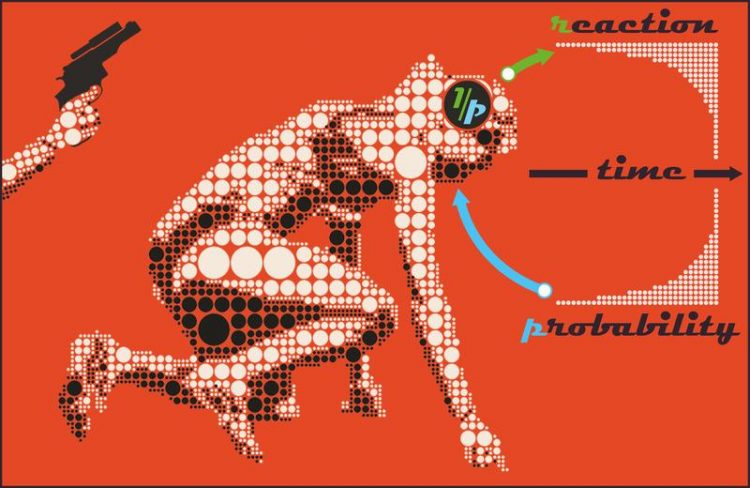The Anticipation of Events in Time

The reaction time to a stochastic event is proportional to the reciprocal of its probability Figure by Georgios Michalareas
How does the brain learn when an event is more probable to happen?
It has been a long-standing question how the brain represents probabilities across time. The main candidate mechanism to date has been the computation of Hazard Rate, i.e., the probability that an event is about to happen given that it has not happened already.
In their article in Nature Communications, Matthias Grabenhorst, Georgios Michalareas and other reasearchers demonstrate with behavioral experiments that the brain uses a much simpler computation instead—it just estimates the reciprocal of probability.
This is a fundamental finding, shedding light onto a canonical principle of how the brain models probabilities. The close relationship between the reciprocal probability and Shanon information content (also termed Surprisal) hints that the brain actually represents probabilities in terms of information.
“Probability itself is the fundamental parameter used by the brain”, says lead author Matthias Grabenhorst.
A second important finding in this work concerns the uncertainty in estimation of elapsed time. Previous research has demonstrated that the longer the elapsed time, the higher the uncertainty in its estimation by the brain.
Grabenhorst and his colleauges present evidence that this principle of monotonically increasing uncertainty with elapsed time does not always hold.
It is actually the probability distribution of events across time which determines when uncertainty is lowest or highest.
Finally, the authors show that the above findings hold in three different modalities: vision, audition, and somatosensation.
This commonality hints to either a central mechanism used by all three modalities or by a canonical peripheral mechanism employed in multiple sensory areas of the brain.
Dr. med. Matthias Grabenhorst
+49 69 8300479-340
matthias.grabenhorst@ae.mpg.de
Grabenhorst, M., Michalareas, G., Maloney, L. T., & Poeppel, D. (2019). The anticipation of events in time. Nature Communications, 10(1). doi:10.1038/s41467-019-13849-0
Media Contact
More Information:
http://www.ae.mpg.de/All latest news from the category: Health and Medicine
This subject area encompasses research and studies in the field of human medicine.
Among the wide-ranging list of topics covered here are anesthesiology, anatomy, surgery, human genetics, hygiene and environmental medicine, internal medicine, neurology, pharmacology, physiology, urology and dental medicine.
Newest articles

A new puzzle piece for string theory research
Dr. Ksenia Fedosova from the Cluster of Excellence Mathematics Münster, along with an international research team, has proven a conjecture in string theory that physicists had proposed regarding certain equations….

Climate change can cause stress in herring larvae
The occurrence of multiple stressors undermines the acclimatisation strategies of juvenile herring: If larvae are exposed to several stress factors at the same time, their ability to respond to these…

Making high-yielding rice affordable and sustainable
Plant biologists show how two genes work together to trigger embryo formation in rice. Rice is a staple food crop for more than half the world’s population, but most farmers…



